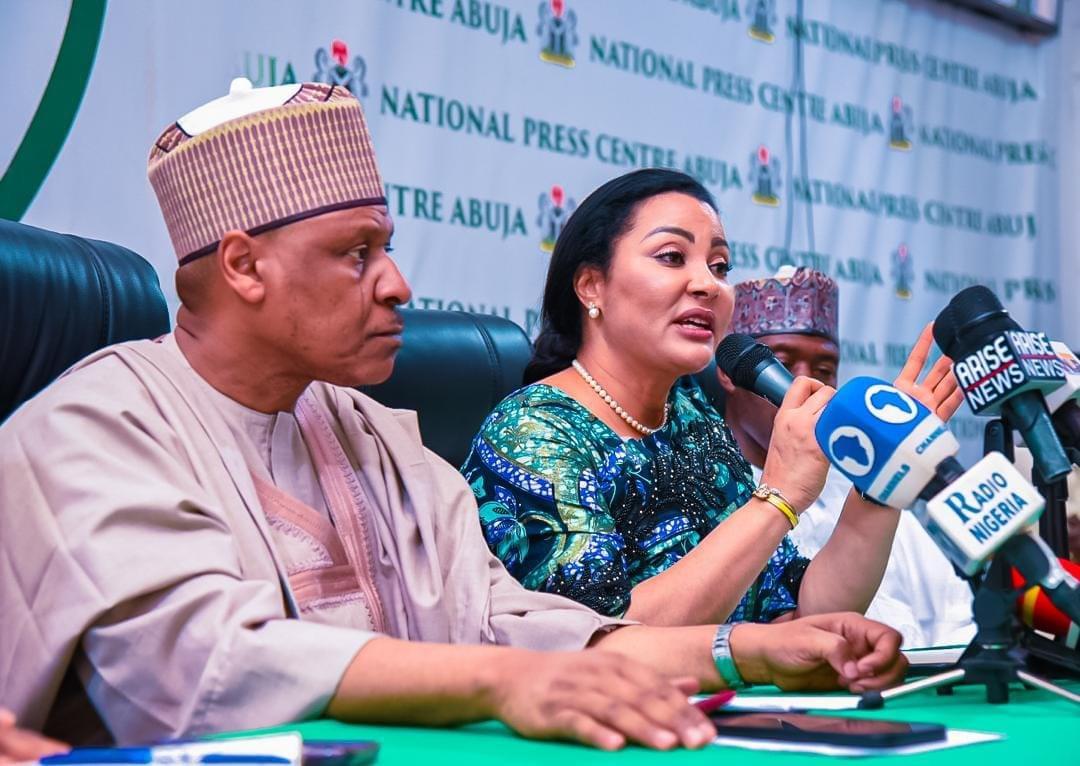Special Guest: Dr. Doris Uzoka-Anite, Honorable Minister of Industry, Trade and Investment
Date: February 16, 2024
The Honorable Minister of Industry, Trade and Investment, in this media briefing, reeled out her Ministry’s efforts and activities in achieving its mandate of attracting investment, facilitating trade and advancing the industrialization of Nigeria:
- The President Bola Ahmed Tinubu-led administration has attracted $30 billion in Foreign Direct Investment (FDI) commitments into the real sectors of the economy, since assumption of office. These investment commitments—covering various sectors, including Manufacturing, Telecoms, Healthcare, Oil and Gas, and others—are already being realized.
- The Ministry has commenced processes for the disbursement of N200 Billion Naira, approved by President Tinubu, through three (3) new special intervention funds established as part of measures to bring post-subsidy-removal relief to businesses: The Presidential Conditional Grant Scheme (PCGS), the FGN MSME Intervention Fund, and the FGN Manufacturing Sector Fund:
a. The 50 Billion Naira Presidential Conditional Grant Scheme (PCGS) will provide grants and loans to traders, food vendors, transport workers, ICT businesses, creatives and artisans, as part of interventions to cushion the effect of the removal of petrol subsidies. Verification of all submitted applications is ongoing, and disbursements—to be handled by SMEDAN and BOI—will commence as soon as verification is completed.
b. The 75 Billion Naira FGN MSME Intervention Fund will provide single-digit-interest loans to MSMEs.
c. The 75 Billion Naira FGN Manufacturing Sector Fund targeting manufacturing businesses, with selected beneficiaries eligible to access up to 1 Billion Naira each.
- To ensure that Nigeria retains more foreign exchange from its exports, the Export Permit application process is being revised and automated. Intending exporters will now have to show genuine proof of formal repatriation of export proceeds before new export licenses and permits are granted.
- To address the challenges of skilling and job creation, the Ministry of Industry, Trade and Investment and its agencies have launched the following:
a. The National Talent Export Programme (NATEP), launched by the Ministry on the sidelines of the 78th United Nations General Assembly (UNGA), as a special purpose vehicle for skills development and talent outsourcing (matching Nigerian skills with globally-available jobs), to create one million jobs for Nigerians. NATEP is currently finalizing its set-up process.
b. Skill-Up Artisans (SUPA), a program of the Industrial Training Fund (ITF) designed to empower 10 million Nigerian artisans with improved skills and professional licenses. As part of this, the ITF is partnering with AHK of Germany and City & Guilds of London to provide international-standard curriculums and vocational certifications to Nigerian artisans.

c. The Ministry is opening physical and virtual Job Centers across the country as part of efforts to tackle unemployment. These Centers will provide job-availability information and work preparation training to unemployed and under-employed Nigerians.
- The Ministry in partnership with Nigerian Diaspora Commission is launching a Nigerian Diaspora Investment Initiative and a Diaspora Investment Fund. The Ministry has also established a new “Catalytic Investment Unit” to oversee these diaspora investment facilitation matters.
- The Presidential Council on Industrial Revitalisation is currently working on the needed framework to implement a well-structured and functioning consumer credit system in Nigeria, in line with global best practices.
- The Ministry is reconstituting the National Trade Facilitation Committee, which convenes various relevant agencies and private sector representatives (under the leadership of the Ministry), to resolve and remove administrative and operational bottlenecks facing domestic and external trade in the country.
- The Nigeria Commodity Exchange (NCE), an agency of the Ministry, is being revamped and repositioned to enable it de-risk the commodities value chain, covering agriculture produce, solid minerals, and oil & gas. The benefits of a functioning NCE include reduced spoilage of food, increased food supplies, and increased access to low-cost capital for farmers.
- As part of measures to de-risk domestic and foreign investments and strengthen business sustainability, the Federal Government has been engaging with the African Development Bank, Afrexim Bank, Ministry of Finance Incorporated (MOFI) and other financing institutions. One of the outcomes of this is the establishment of a 120 Billion Naira “Project Preparation Facility”, that will help support new investment projects and provide early-stage comfort to investors.
- The Corporate Affairs Commission (CAC) has been mandated to operate a 24-hour online registration timeline for new businesses, as part of Ease of Doing Business reforms.
Prepared by:
Information & Insights Unit
Office of the Minister of Information and National Orientation



















Hi there,
I have reviewed your domain in MOZ and have observed that you may benefit from an increase in authority.
Our solution guarantees you a high-quality domain authority score within a period of three months.
This will increase your organic visibility and strengthen your website authority, thus making it stronger against Google updates.
Check out our deals for more details.
[Link deleted]
NEW: Ahrefs Domain Rating
[Link deleted]
Thanks and regards
Zulma
Hi,
As a business owner, I know how important it is to get the most out of your advertising budget. That’s why I wanted to share a great opportunity with you – AdCreative.ai.
With AdCreative.ai, you’ll get access to a powerful AI-powered platform that makes it easy to create professional ads and social media content.
Plus, when you sign up through my link [Link deleted], you’ll get $500 in Google Ad credit to help jumpstart your advertising efforts.
Don’t miss out on this limited-time offer. Sign up for AdCreative.ai today and start maximizing your advertising budget.
Once again, sign up through my link: [Link deleted]and get $500 in Google Ad credit.
Sincerely,
Dylan
Hi,
I just wanted to politely get back on top of your inbox with my request.
Try Adcreative.ai for free through my link: [Link deleted]and don’t forget to claim your $500 Google Ads credits.
Regards,
Myrtis
Hey,
I came across your website and was really impressed by what you’re doing. As a fellow business owner, I know how much hard work goes into building a successful company.
I wanted to reach out and introduce AdCreative.ai. We help businesses like yours create professional ads and social media content in minutes, all with the help of our AI-powered platform.
If you’re looking to improve your online presence and drive more traffic and sales to your business, sign up for free through my link: [Link deleted]and ge $500 Google Ads credits in bonus.
Best,
Dannielle
Hi,
I am Chelsea. I research and promote SAAS products that are game-changers for marketers like you.
I get a small portion of the sales, which helps me keep doing what I love- researching and getting you the best products possible!
Today, I want to tell you about a fantastic AI platform that can generate hundreds of creatives for any of your social ads in just a few seconds.
It’s called Adcreative.ai, and you will be blown away by its easy and cost-effective use.
It’s like Canva, which got a Ph.D. in designing ads!
Why should you use it, and how does it change the game?
Take a moment to think about it-
Google asks you for 20 variations of creatives and texts in all formats (Landscape, vertical, square) for their latest Performance Max Campaigns.
Facebook dynamic ads are equally demanding.
As a
● Create all the creatives for every ad platform in every format conceivable!
● Let you be the designer without any need for design experience!
● It tells you which creatives will do well with an AI scoring system.
● Allows you to push all your creatives from one place with integrations.
● It also allows you to generate social media posts in an instant! (New Feature)
● It has an integrated Text Ai to write fantastic ad copies!
● It also gives insights into how your creatives perform in ad campaigns!
Moreover, you get $500 free Google Ad credits when you join through [Link deleted]and it has a 7-day free trial!
Once you start using it, you will see the difference in how fast you scale your business.
I would love to know your feedback after you have used it extensively. Feel free to write back to me.
And here’s how Adcreative.ai comes to the rescue and saves you time, effort, and money.
Remember to sign up through my link [Link deleted]for exclusive benefits. Looking forward to your success with AdCreative.ai!
Thanks and regards
Chelsea